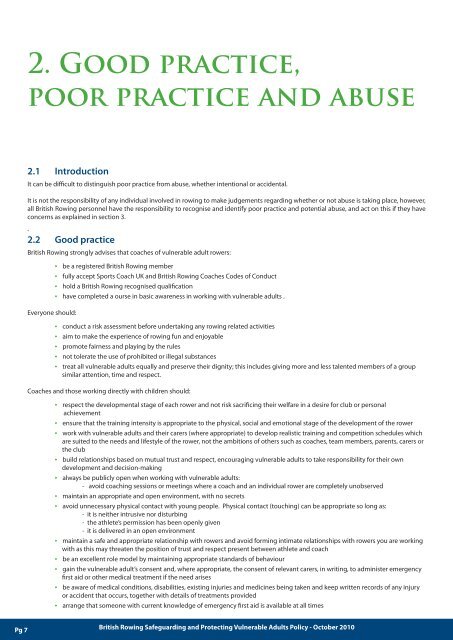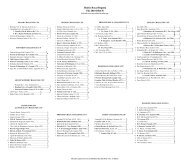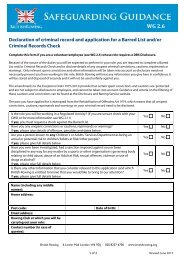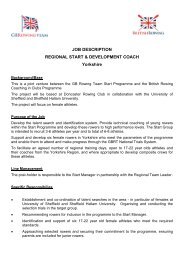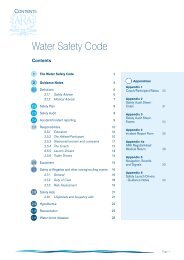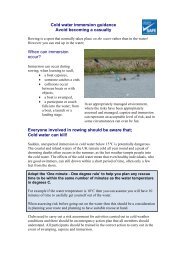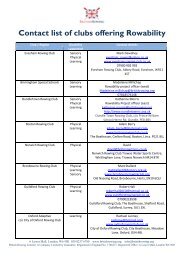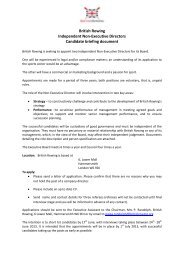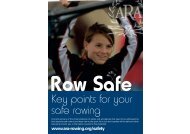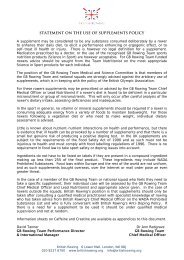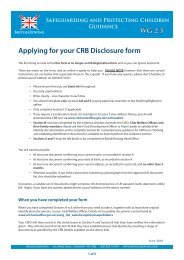British Rowing Safeguarding and Protecting Vulnerable Adults Policy
British Rowing Safeguarding and Protecting Vulnerable Adults Policy
British Rowing Safeguarding and Protecting Vulnerable Adults Policy
You also want an ePaper? Increase the reach of your titles
YUMPU automatically turns print PDFs into web optimized ePapers that Google loves.
2. Good practice,poor practice <strong>and</strong> abuse2.1 IntroductionIt can be difficult to distinguish poor practice from abuse, whether intentional or accidental.It is not the responsibility of any individual involved in rowing to make judgements regarding whether or not abuse is taking place, however,all <strong>British</strong> <strong>Rowing</strong> personnel have the responsibility to recognise <strong>and</strong> identify poor practice <strong>and</strong> potential abuse, <strong>and</strong> act on this if they haveconcerns as explained in section 3..2.2 Good practice<strong>British</strong> <strong>Rowing</strong> strongly advises that coaches of vulnerable adult rowers:Everyone should:• be a registered <strong>British</strong> <strong>Rowing</strong> member• fully accept Sports Coach UK <strong>and</strong> <strong>British</strong> <strong>Rowing</strong> Coaches Codes of Conduct• hold a <strong>British</strong> <strong>Rowing</strong> recognised qualification• have completed a ourse in basic awareness in working with vulnerable adults .• conduct a risk assessment before undertaking any rowing related activities• aim to make the experience of rowing fun <strong>and</strong> enjoyable• promote fairness <strong>and</strong> playing by the rules• not tolerate the use of prohibited or illegal substances• treat all vulnerable adults equally <strong>and</strong> preserve their dignity; this includes giving more <strong>and</strong> less talented members of a groupsimilar attention, time <strong>and</strong> respect.Coaches <strong>and</strong> those working directly with children should:• respect the developmental stage of each rower <strong>and</strong> not risk sacrificing their welfare in a desire for club or personalachievement• ensure that the training intensity is appropriate to the physical, social <strong>and</strong> emotional stage of the development of the rower• work with vulnerable adults <strong>and</strong> their carers (where appropriate) to develop realistic training <strong>and</strong> competition schedules whichare suited to the needs <strong>and</strong> lifestyle of the rower, not the ambitions of others such as coaches, team members, parents, carers orthe club• build relationships based on mutual trust <strong>and</strong> respect, encouraging vulnerable adults to take responsibility for their owndevelopment <strong>and</strong> decision-making• always be publicly open when working with vulnerable adults:- avoid coaching sessions or meetings where a coach <strong>and</strong> an individual rower are completely unobserved• maintain an appropriate <strong>and</strong> open environment, with no secrets• avoid unnecessary physical contact with young people. Physical contact (touching) can be appropriate so long as:- it is neither intrusive nor disturbing- the athlete’s permission has been openly given- it is delivered in an open environment• maintain a safe <strong>and</strong> appropriate relationship with rowers <strong>and</strong> avoid forming intimate relationships with rowers you are workingwith as this may threaten the position of trust <strong>and</strong> respect present between athlete <strong>and</strong> coach• be an excellent role model by maintaining appropriate st<strong>and</strong>ards of behaviour• gain the vulnerable adult’s consent <strong>and</strong>, where appropriate, the consent of relevant carers, in writing, to administer emergencyfirst aid or other medical treatment if the need arises• be aware of medical conditions, disabilities, existing injuries <strong>and</strong> medicines being taken <strong>and</strong> keep written records of any injuryor accident that occurs, together with details of treatments provided• arrange that someone with current knowledge of emergency first aid is available at all timesPg 7<strong>British</strong> <strong>Rowing</strong> <strong>Safeguarding</strong> <strong>and</strong> <strong>Protecting</strong> <strong>Vulnerable</strong> <strong>Adults</strong> <strong>Policy</strong> - October 2010


